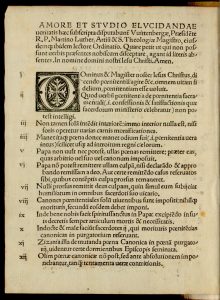
TUSCALOOSA, Ala. — Several departments within The University of Alabama will present a symposium celebrating the 500th anniversary of the Protestant Reformation Monday, Oct. 30, a half century after Martin Luther originally nailed his 95 theses to the doors of a Roman Catholic church.
The event, “The Protestant Reformation 1517-2017: 500 Years of Faith, History, and the Arts,” will be held in the Moody Music Building Concert Hall and is free and open to the public.
An opening reception and curated book exhibit will begin at 5 p.m., while presentations and performances will start at 6 p.m.
The College of Arts and Sciences, the School of Music, University Libraries Special Collections and the Hudson Strode Program in Renaissance Studies organized the symposium, which consists of a series of brief lectures and musical performances that celebrate the historical origins and effects of the Protestant Reformation in the modern world.
Martin Luther was an Augustinian monk who changed the course of history when he nailed 95 theses on the door of a Roman Catholic church in order to allow for debate within the church.
The theses addressed the abuse of poorer, uneducated people by the church leadership to increase their own wealth and power, while also urging people to think and talk about their religion themselves.
“He did not know it or even intend it at the time, but these theses ignited a firestorm that eventually led him and many followers to break with the existing church,” said Dr. Kirk Summers, the director of UA’s classics program.
“Luther’s spiritual crisis and the writings that ensued inspired numerous other great reformers who led their own movements.”
The Reformation eventually became known as the Protestant Reformation, which allowed people to read the Bible and understand the religion for themselves and not through the mouth of a priest.
“They believed that reform was an ongoing process and that the church should be, as they put it, always reforming,” Summers said. “This means that the Reformation began a dialogue about religion and society that continues to this day. It is a dialogue that constantly questions our assumptions and institutions, and seeks to know how humanity can best live out its original purpose as designed by God.”
Today, academics consider the nailing of the theses and the Protestant Reformation one of the most prominent events in modern history because of its effects on reading in vernacular languages, a revival of studying ancient languages and opening debate about how to “live out” the Christian lifestyle.
“For these reasons and more, the Reformation permits study from a variety of perspectives,” Summers said, “including those offered by early-modern historians, scholars of English literature, music historians, art historians, theologians and linguists.”
The event will consist of instrumental and vocal performances by members of the UA faculty, as well as lectures on the history and effects of the Reformation. Prior to the presentations, there will be a curated exhibit of rare books and prints. Light refreshments will be provided.
Contact
Stephanie Kirkland, College of Arts and Sciences, 205-348-8663, stephanie.kirkland@ua.edu
Source
Dr. Kirk Summers, 205-348-2503, ksummers@ua.edu
